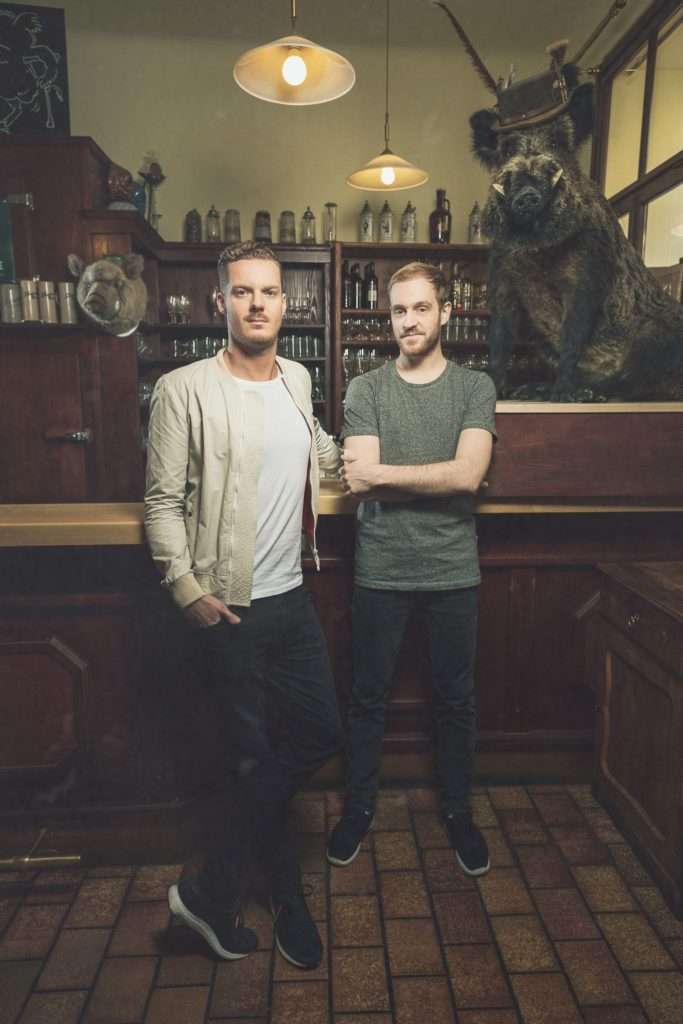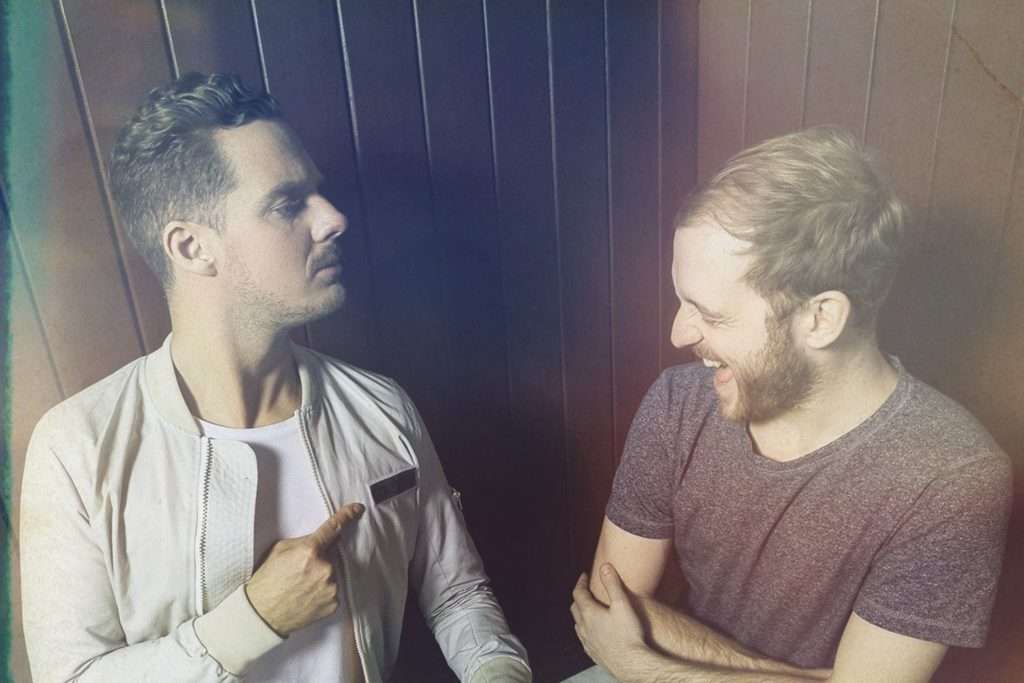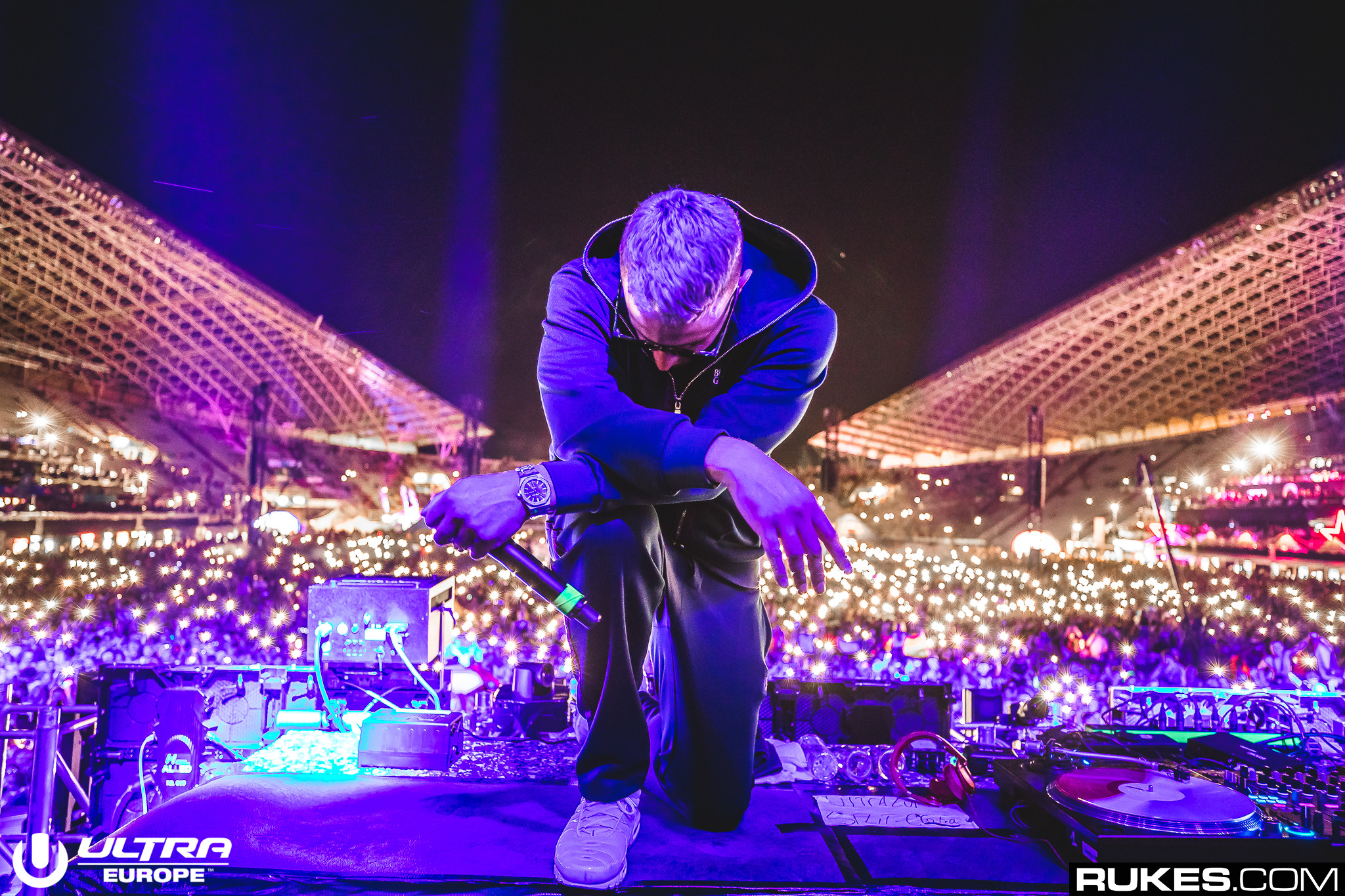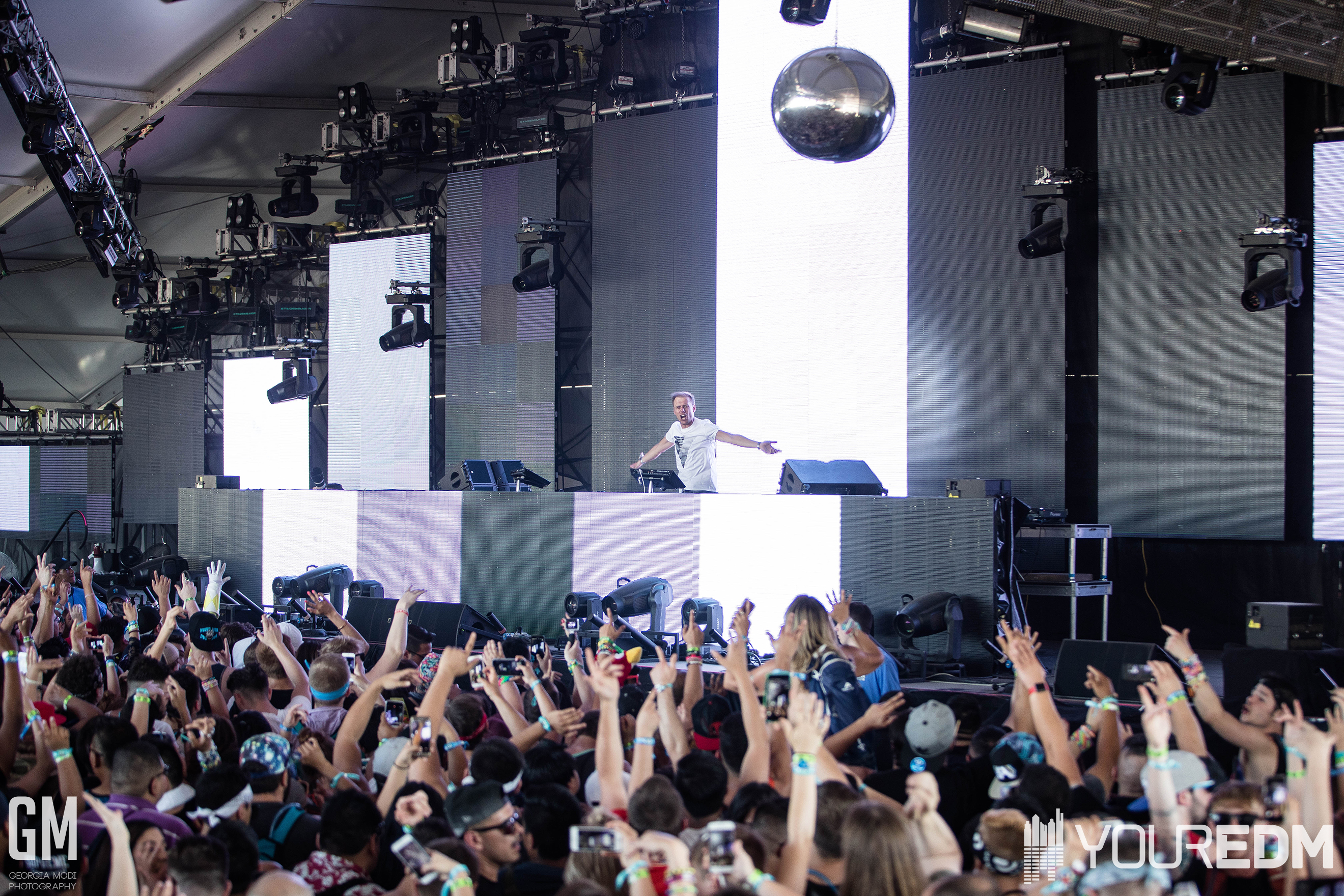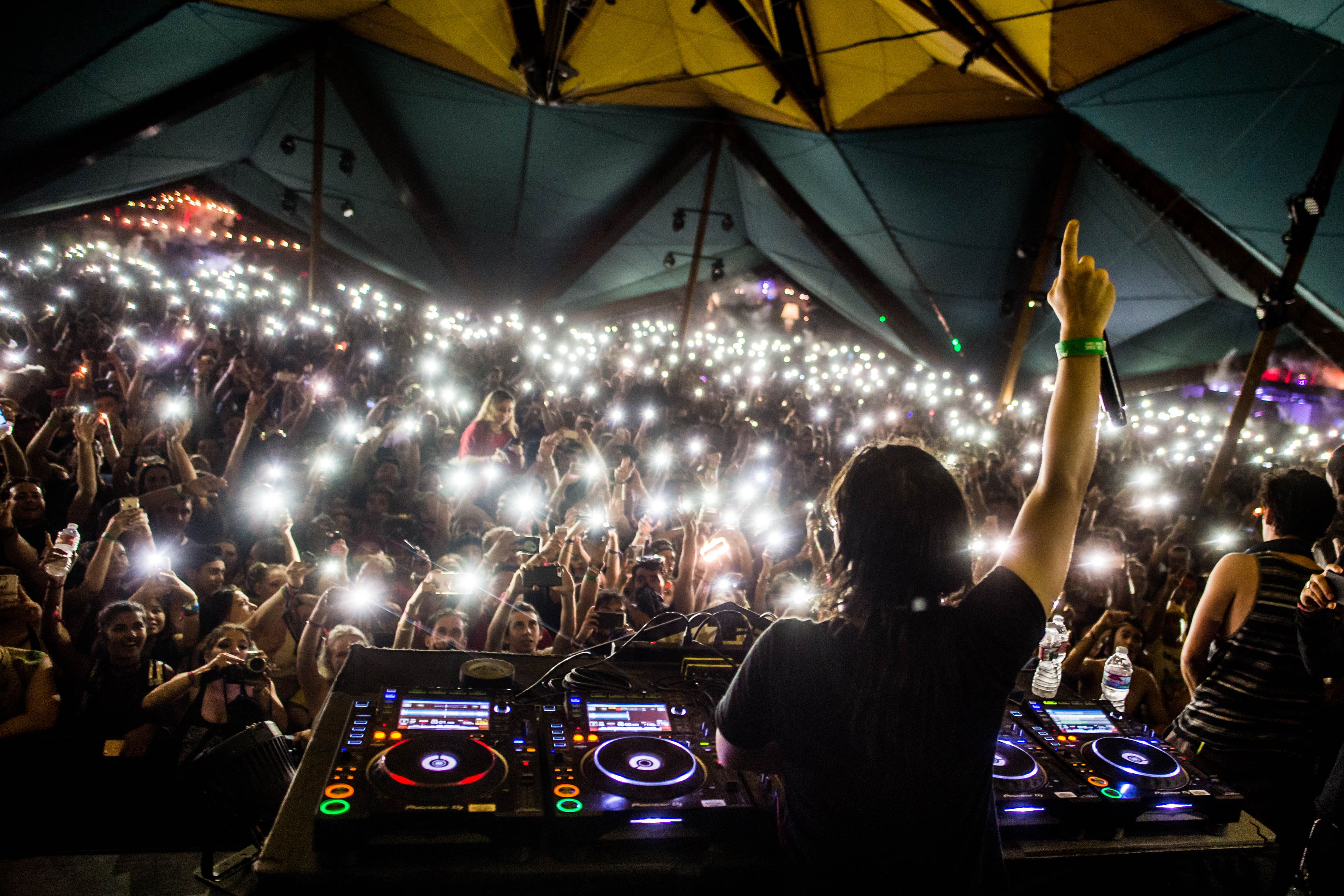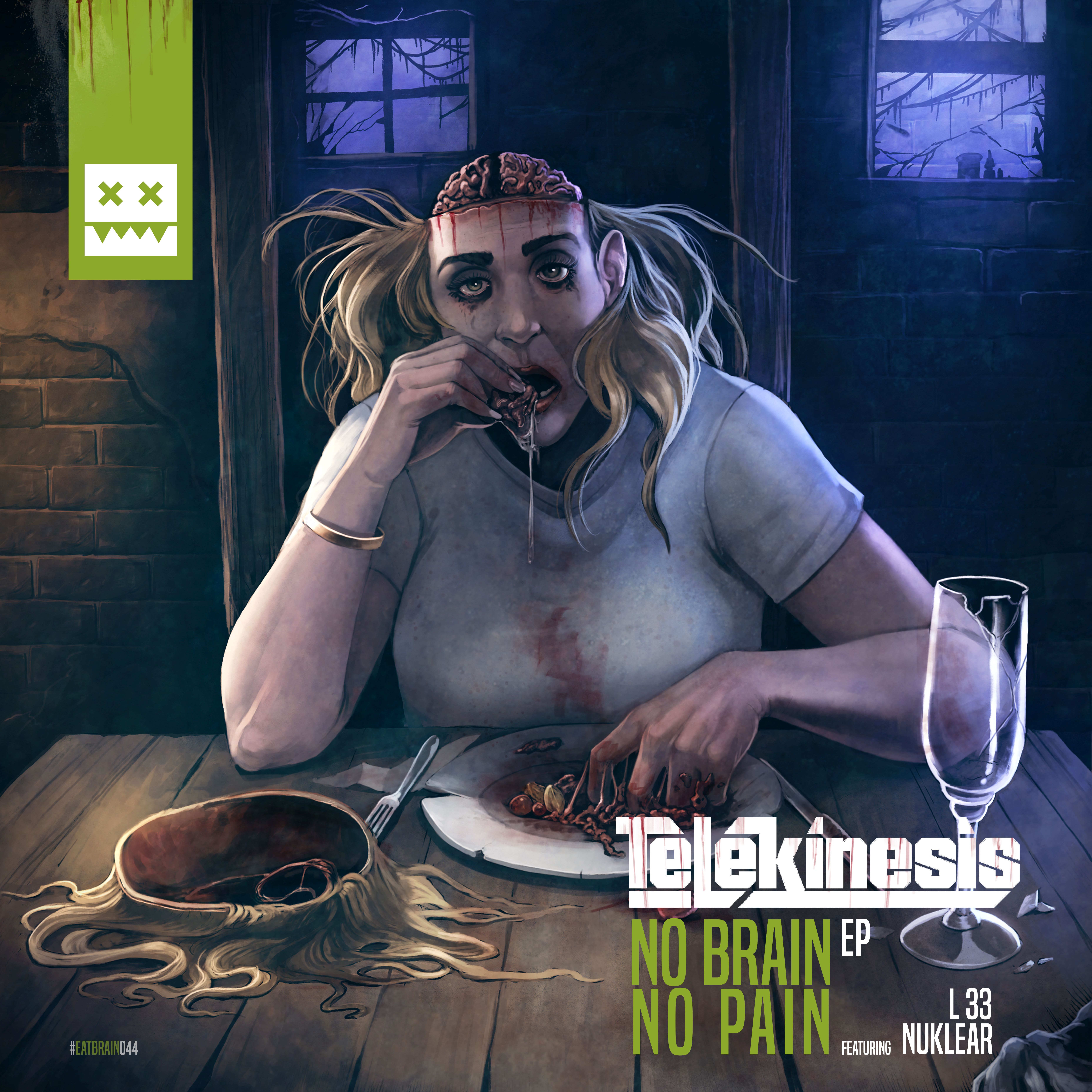The dust has settled a bit since the release of the seminal neurofunk EP from Neosignal artists Phace and Mefjus on September 1, with the five-track EP receiving both high marks critically and heavy plays at the summer closeout festivals in Europe. The Wastemen EP seems, on surface, to have a sort of lighthearted theme between the title and album art, which shows the two producers posing cheekily at a pub with a ’70s ski lodge vibe.
When the German and Austrian neuro strongholds sat down with Your EDM to talk about the album, they revealed that Wastemen is about more than meets the eye – and ear. They also weighed in on technique and the current climate of neuro and hard drum and bass and why they think it’s important to sometimes even waste a little time.
Hi guys, thanks so much for taking the time. The artwork on the EP is a really unique vibe. How did you come up with this visual theme?
Phace: We wanted it to look like an old school bar or movie. The image looks like how a standard dive bar in Germany or Austria looks like. We’re not alcoholics though and we don’t support getting wasted. It was a bit more of, like having a nice and social time off after work and just wasting a bit of your evening with an ‘after work’ beer and chat for reflection. Martin (Mefjus) also mentioned in another interview that the title also hints at us actually wasting our time in front of a PC or in a studio, so the EP in fact represents taking time to breathe, really.
Mefjus: When we got together at my place we tend to have very long working hours and during those days we went to have lunch at a local restaurant. Due to the location of my studio on the Austrian country side those restaurants are very traditional and we were joking about using that vibe as a theme for the artwork. In a way it fits as you would obviously associate having a drink with the word ‘Wastemen’ and a visual bar theme but for us it was more like taking a minute out of our day and hang out as friends and reflect.
Wow that’s surprising that it’s a real restaurant where the cover art was shot. Is it a place that either of you go to often?
Mefjus: That particular restaurant is a place in Vienna called “Hausmair” our Photographer (Samuel Colombo) scouted for us. I wouldn’t typically go there due to the distance from Linz to Vienna but during that shoot the owner, his daughter and the staff were super friendly, so if you’re around Vienna you should definitely check out that place.
Phace: We definitely enjoy having a good time and having a cold beer once in a while – Too much work is a waste as well because if you get too tired and loose the focus you’re not producing your best.
That sort of ties in to some of the tracks on the EP, does it? In “Decisions,” for example – that vocal used says it’s really not about trying to fill your day with work and self-improvement but sometimes making a decision to chill out. Was that the reason you picked it?
Phace: We did pick that vocal for “decisions” – because that was exactly how we put the track together. It was so many different decisions along the way to finish this track. When I work with Martin I think we have a very good workflow and we try to do a lot of things on purpose but sometimes it also comes down to these quick decisions like to go with one drum loop or bass groove versus another. We felt like it was endless decisions with this track, so really that’s how we came up with the name.
Mefjus: Yeah I think the final version was version 27, wasn’t it? That was a long process to get through that track. Lots of compromises and decisions (both laugh).
Speaking of technical process and making those kinds of decisions on sound design, there seems to be a push in the UK to make sure things don’t get too technical in neuro and to sort of keep the “funk” in neurofunk. What do you guys think about that and the evolution of techy dnb and neurofunk?
Mefjus: Wow, there’s a lot to that. First of all I can’t really speak for the UK as I don’t live there.
I think for the two of us and for this project especially, we’re both perfectionists and we both had a certain idea in our minds how the mixdowns generally should sound in terms of the weight and the elements that are in there. We have a very specific idea of how we want our music to sound and it’s sort of mix after mix after mix until we are happy with it.
The other side, how that generally fits into this larger context, I guess neuro is oversaturated a little bit, but I do think it’s sort of a natural progression. I think those things are like a sine wave, generally everything in life is pretty much a sine wave for that matter. This subgenre had positive amplitude for quite a long time, and now it’s changing to something else. It’s just natural I think.
I do think though that “neurofunk” could benefit from more actual funk and less super angry stuff.
So for the two of you being in the center of that phenomenon, what do you feel your own trajectory is?
Mefjus: I can only really speak for myself, but I think it’s just a combination of those things, the idea that we want to create a fresh sound in the studio and really focusing on making sure that the sound design and the initial idea in our heads translates to the track and also what keeps people interested. For me in the studio I just want to do what keeps me entertained, and hopefully it matches up with some people out there too.
Phace: I can agree with what Martin said and add also that I think there often may not be enough “funk” these days in neuro and I find it a bit sad that people tend to forget that the idea and story to a track make it stand out. It’s not a soulless tool or product one should create. To come up with quite a polished mixdown these days isn’t that complicated anymore with all the technology at hand. Of course, a good mixdown is very important too, so a track sounds good on a large scale PA (system), but I think it’s as or even more important to focus on the story of a track. If both things go hand in hand it’s a win-win!
It also comes to just what each producer wants to say and state what they are about in their sound and I appreciate those who are stating that they don’t want it so controlled. I think that’s what makes it more diverse (as a genre), and I think that’s what Martin and I had in mind when we wrote this EP. Not to just offer the hardest shit ever but also transport our own take on vibes, funk and soul with this EP.
And do you think you achieved that?
Phace: Yes, I believe so. Otherwise we wouldn’t have finished it! I just want to make things that excite me and that is what any artist should do anyways.
So if that’s the way you like to work generally together, where you’re just experimenting and then you hit on something you both like, how do you know when you have it?
Mefjus: I remember when I got in touch with Florian first a couple of years ago, he gave me some really good advice which is you don’t have to feel like you have to release a tune a month, and only to release when there is a good reason for it and when you have something to say. There’s no point in doing the same thing over and over again, so we allowed ourselves time on this project.
Phace: Thank you Martin! I do think it’s more important in these moments to understand what you create and give it the right timing. I think we both come to the studio with an idea of a sound in our mind. I always have a lot of ideas but sometimes it’s trickier for me to translate them because I’m a very confused person (both laugh). I sometimes tend to take a little longer with things, but that is just the way I work. Working with Martin is very nice because he’s very skilled and a real engineer in the way he solves problems and brings it on paper. But we really both also focus on feeling the tune and not just treating it like it’s a technological product. That never worked for me. I mean what we do in electronic music is also highly technical but solely focusing on that just doesn’t do it for me and you lose everything that is the artist side of it. That’s why I make music, because it gives me goosebumps. If success comes along that’s ok, but that’s not what I want to focus on in the studio and is not the reason why I ever started writing music.
Mefjus: So to bring this full circle, it’s both accidents and control that make the track happen. Sometimes things come together by accident, and sometimes we play around to find something new. Yet other times we are trying to come up with a new approach on purpose and really force it so all those things work together on the tracks. You know putting the song together, you have the stems here you have your instruments there and you mix whilst arranging and arrange whilst mixing, but it’s those moments where you find something special or new and then apply it to your song which can take it to the next level.
So where does that process start?
Mefjus: Quite often it starts with a sample. Like with the vocals on “The Mothership” for example. Florian found this vocal and all of a sudden we instantly knew how we wanted to structure the song around that. That track was pretty much written in one sitting.
Phace: Sometimes you really just need one starting point, whether it’s just one bass loop or one vocal or special sound to start from and you get this idea and things just fall into place. I need a narrative and a brainstorm to create – it’s like writing a book almost. I need a headline, and then the story of the song comes out from there.
Mefjus: It’s true; just one word can give you that spark and a path into the whole thing. I often start with sound design and I’ll have this cool, clean eight-bar loop but then it doesn’t say anything so finding that vocal or an idea helps you a lot to find that direction.
So you would say then that Martin you’re more the engineering sound design guy and Flo is more artistic and vibey? I would have thought it was the other way around (both laugh)
Mefjus: Well when we say that we just mean from what we’re interested in. I think Florian has as much technical skill as me or anyone out there, but I personally just really like the sound design aspect of making music and he comes at it from a more storytelling place and he has a more kind of rock and roll attitude towards that. Also Florian always sees the bigger picture which I tend to lose sight being in my little eight-bar world.
Phace: I think Martin is one of the best producers out there. He knows his stuff. I feel like I learn something new every time I work with him and whenever we find the time to go into the studio together we share different production tips, approaches and tricks and try to excite each other with that too.
So you both work on all parts of each song together, it’s not one of you does drums and the other does vocals or something?
Both: Yeah of course.
Mefjus: Of those four songs we actually wrote three of them in Cubase and one in Ableton. We started each idea when we were both in the studio together but we also worked on them separately in the finishing phase. That meant we had to use both DAW’s in both studios and agree on a pool of plugins we knew the other person has. It was fun learning Ableton, which I have been using sometimes since, but also great showing Flo some things that have changed in Cubase since he last used it. Ultimately I can say this EP is as collaborative as a collab EP can be.
Phace: It was a really nice project that way because we both worked on everything even though it was tricky to jump between studios and to import the projects on our different DAW’s, in the end I thought like wow this is a really nice, coherent piece of music because of exactly the way we did it. I think it was like one and a half years!
Wow that’s a long time but I’d say it’s well worth it. So what’s up next for the two of you?
Phace: Well now that we’ve finished the summer festivals, I’m going to focus on my solo music so I think that will take up a lot of my time in the fall and winter. I just want to see where I’m going to take it. I do have a few club shows lined up till end of the year, but no bigger tour is planned. So I’m not really making any plans for touring until the New Year starts. That’s for my own health as well because when you just tour and tour and tour, it’s easy to get tiring and it’s not really anything special anymore so I’d rather take my times off and to reflect on what I do and more time to breathe again and come back excited.
Mefjus: I do have some tracks coming up as well but it’s in very early stages so I don’t want to say too much, but that’s a very important point Florian just made and again sort of what ‘Wastemen’ is about. If you’re constantly touring or constantly working on tracks or just working all the time, it’s important to take time off and have a good mindset as well. It’s important for your own health to spend time with friends, do sport, and, like we said, waste some time for your own good.
The Wastemen EP from Mefjus and Phace is out now on Neosignal. All purchase and streaming links can be found on the Neosignal website, which also has a free download of the EP closer, “The Mothership.” Stay tuned for announcements of upcoming projects from both artists this winter.


